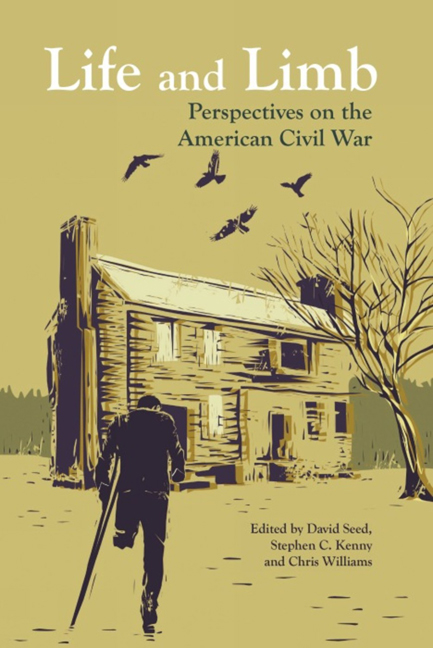Book contents
- Frontmatter
- Contents
- List of Illustrations
- Acknowledgements
- Introduction: Civil War Voices and Views
- MEDICAL AND SURGICAL MEMOIRS
- ACCOUNTS OF NURSING
- MEDICAL FACILITIES AND PATHOLOGY
- Jonathan Letterman on the Medical Corps: Medical Recollections of the Army of the Potomac
- The Confederate Military Prison Hospital at Andersonville, Georgia: Contributions Relating to the Causes and Prevention of Disease
- Field Hospitals: A Glimpse: Hardtack and Coffee
- Field Hospitals: The Need: A Manual of Military Surgery
- Plea for an Ambulance Service: A Brief Plea for an Ambulance System
- Hospital Broadside: North Carolina Hospital Broadside, 1863
- Hospitals in Richmond, Virginia: A Diary from Dixie
- Malingering: ‘Surgical Reminiscences of the Civil War’ and A Rebel's Recollections
- Roberts Bartholomew on Nostalgia: Contributions Relating to the Causes and Prevention of Disease
- Medical Welfare Begins: ‘Debut and Prospectus (The Crutch) and ‘Wounded’ (poem by ‘Sanatosia’)
- (Dis)embodied Identities: Civil War Soldiers, Surgeons, and the Medical Memories of Combat
- PHOTOGRAPHY
- AMPUTATIONS AND PROSTHETIC LIMBS
- IN THE FIELD OF BATTLE
- POST-WAR NARRATIVES
- Contributors
- Select Bibliography
- Index
- Plates
(Dis)embodied Identities: Civil War Soldiers, Surgeons, and the Medical Memories of Combat
from MEDICAL FACILITIES AND PATHOLOGY
- Frontmatter
- Contents
- List of Illustrations
- Acknowledgements
- Introduction: Civil War Voices and Views
- MEDICAL AND SURGICAL MEMOIRS
- ACCOUNTS OF NURSING
- MEDICAL FACILITIES AND PATHOLOGY
- Jonathan Letterman on the Medical Corps: Medical Recollections of the Army of the Potomac
- The Confederate Military Prison Hospital at Andersonville, Georgia: Contributions Relating to the Causes and Prevention of Disease
- Field Hospitals: A Glimpse: Hardtack and Coffee
- Field Hospitals: The Need: A Manual of Military Surgery
- Plea for an Ambulance Service: A Brief Plea for an Ambulance System
- Hospital Broadside: North Carolina Hospital Broadside, 1863
- Hospitals in Richmond, Virginia: A Diary from Dixie
- Malingering: ‘Surgical Reminiscences of the Civil War’ and A Rebel's Recollections
- Roberts Bartholomew on Nostalgia: Contributions Relating to the Causes and Prevention of Disease
- Medical Welfare Begins: ‘Debut and Prospectus (The Crutch) and ‘Wounded’ (poem by ‘Sanatosia’)
- (Dis)embodied Identities: Civil War Soldiers, Surgeons, and the Medical Memories of Combat
- PHOTOGRAPHY
- AMPUTATIONS AND PROSTHETIC LIMBS
- IN THE FIELD OF BATTLE
- POST-WAR NARRATIVES
- Contributors
- Select Bibliography
- Index
- Plates
Summary
Writing to her mother from Virginia in the summer of 1862, Civil War nurse Katharine Prescott Wormeley described the men under her care as presenting ‘a piteous sight.’ No one, she went on, ‘knows what war is until they see this black side of it.’ She reassured her mother, however, that it was not all misery. ‘We see the dark side of all. You must not, however, gather only gloomy ideas from me. I see the worst,’ she wrote, ‘short of the actual battle-field, that there is to see.’
What Wormeley did see was grim. She described ‘four or five amputations. One poor fellow,’ she reported, had been ‘shot through the knee,’ and was ‘enduring more than mortal agony; a fair-haired boy of seventeen,’ had been ‘shot through the lungs, every breath he draws hissing through the wound.’ She noted, too, that it was not the wounds that posed the greatest threat to life on the James Peninsula in the spring of 1862, but ‘the terrible decimating diseases brought on by exposure and hardships and the climate of marshes and watercourses.’ And the physical effects were hardly the worst of it. Anyone, she observed, who ‘sees the suffering, despondent attitudes of the men, and their worn frames and faces, knows what war is, better than the sight of wounds can teach it.’ Wormeley was especially distressed by several cases of attempted suicide that she encountered; soldiers so destroyed by their experiences that they were ‘out of their minds.’ One had tried to drown himself three times. Yet, for Wormeley, the maimed bodies and the suffering she witnessed and struggled to alleviate neither dampened her dedication to her work nor undermined her support for the Union cause. ‘This is life,’ she enthused in the midst of death.
The Cruel Side of War
The eventual publication of Wormeley's letters from the James Peninsula in 1888 was designed, as its title made clear, to highlight The Other Side of War. But there was an ambiguity in this title. ‘Other’ could refer to the medical challenges that the war posed; equally, it could simply have referred to the work of Union nurses, a reminder that women, as well as men, had played their part in the Civil War.
- Type
- Chapter
- Information
- Life and LimbPerspectives on the American Civil War, pp. 80 - 92Publisher: Liverpool University PressPrint publication year: 2015



